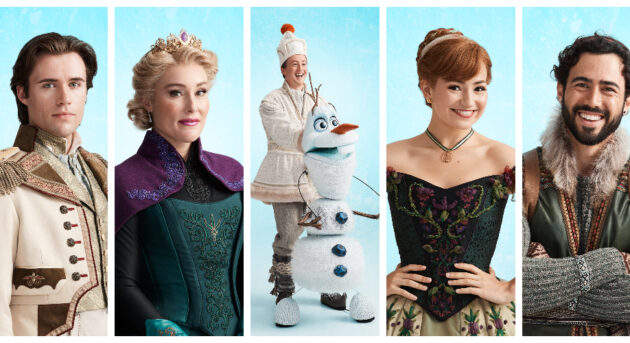The Success of Frozen: Location, Location, Location?
At the risk of being proven embarrassingly wrong, here’s a bold prediction: when Frozen: The Musical opens in Sydney this December, it is destined to captivate Aussie theatre-goers in a way it could not quite manage on Broadway.
There can be few individuals on this planet who are not familiar with the success of Frozen (Disney’s reworking of Hans Christian Andersen’s The Snow Queen), which has somehow managed to infiltrate our collective consciousness over the last half-decade or so. Adapting the massively popular film version to stage clearly seems a sound business move. And yet, prior to its enforced closure due to the pandemic crisis, this musical’s Broadway reception could only be described as somewhat slushy.
An Icy Response?
Under theatre heavyweight and Tony Award-winning Michael Grandage’s aegis, Frozen was never going to be a complete failure. A show costing in the region of $30 million to produce carries high expectations and endless marketing opportunities. And Broadway, probably the globe’s best-known and most highly esteemed theatrical hub, is the ultimate location to showcase such an extravaganza. Breaking Box-Office records would not be an unrealistic aim. Superseding the monumental popularity of the film and morphing the animated characters into three-dimensional dramatis personae could only bode well, right? You’d think so. So the rather mediocre success of this mammoth of a musical is somewhat surprising and baffling.
When the show closed in New York earlier this year (March 11th at the St James Theatre was its last outing) after 825 performances and 26 previews, Disney’s President of Theatrical Productions, Thomas Schumacher, cited the pandemic as the reason for terminating Frozen’s Broadway run. Schumacher further justified the decision to call time on the musical’s dalliance with Broadway by explaining that sets and costumes could be repurposed for the projected runs in London, Sydney, Hamburg and Tokyo. An expedient move? Of course. Yet weekly Box-Office takings peaked at only $2.6 million and in February 2020 averaged an insipid $1 million. Not exactly slim pickings – but decidedly underwhelming in the context of Frozen’s manpower, investment and provenance. Reviews were not universally enthusiastic: despite general agreement that the musical’s songs and stars sparkled (something of a relief!), some reviewers perceived it as lacking in magic and imagination, or ‘playing it safe’. One reviewer, Charles McNulty, described the performance he watched as ‘agreeable competence’. Talk about damning with faint praise… But this is Broadway. This may well be generalising, of course, but New Yorkers are a notoriously cynical and hard-to-please lot; visitors to New York’s theatre-land are similarly imbued with sky-high expectations. Let’s add to the mix, too, that Frozen was competing with two musical theatre juggernauts: The Lion King, Broadway’s top-grossing musical of all time and a seasoned crowd-pleaser, as its 22-year run would suggest; and Aladdin, itself a robust fixture, well-established on Broadway after six years. Perhaps Frozen was just one giant too many. Perhaps, when faced with a choice between the established and the new, audiences opted for the safer choice of the former.
Success in Sydney?
So what indicators are there that Frozen can dazzle in Sydney where it ‘failed’ in New York? Can it be elevated from bridesmaid to bride?
And are Sydney audiences really that different from Broadway audiences? Maybe; maybe not. But the location may not be the key factor here. The real difference, it could be argued, lies in timing rather than location. Pre-pandemic, Frozen was simply an item available for selection from a luxurious buffet; an option available to complacent consumers – consumers used to being spoilt for choice. Of course, the pandemic challenged this sense of entitlement. Like Elsa, we were suddenly confronted with the ‘real world’. But this challenge is not unique to Broadway. The world over, theatre-goers are now hungry for access to good quality entertainment after months of cultural starvation. Patrons are ready and willing to support the entertainment industry. They have a new sense of gratitude and appreciation, yielded by prolonged and enforced deprivation. And this is why Australian patrons may well be ready to flock to Sydney’s Capitol Theatre and embrace Frozen – even amid high temperatures.
This particular moment in history is also consistent with the messages conveyed in Frozen. This will not be lost on Australian audiences – or indeed any audiences. If 2020 has taught us anything, it is to rethink our priorities in life. In terms of plot, Frozen is essentially about an odyssey strewn with obstacles that must be overcome. This is rather an obvious metaphor for this year as a whole, something that is sure to resonate with the audience at large.
The largesse of the fairy-tale element (albeit given a feminist update) and glittering set provide much-needed escapism, along with the ‘happy’ finale we expect of such a narrative. This, coupled with the promise of a good old sing-along to tunes even the most hermetic of us will be familiar with, may prove irresistible: the clichéd familiarity in an uncertain world. Who doesn’t feel in dire need of that right now?
But alongside the more whimsical and entertaining aspects of this musical are some very real and pertinent life-lessons. Primarily, it emphasises the value of family, especially the bond between siblings. Ultimately, Anna is made ‘complete’ through the love of her family; this subverts the more traditional tale wherein the female protagonist requires a man to make her ‘whole’ (of course, a purist might argue that a female doesn’t need anyone at all in order to feel validated – but let’s not go there…). This is a reassuring message for hordes of females, but needn’t just be interpreted on a feminist level, because what is really being conveyed here is the notion that family trumps all else. This echoes the message of 2020, a year in which millions have either lost family members or been forced to live separately from them. Similarly, we learn that we all depend on others, and community support is vital: Kristoff, for example, requires help for his business to succeed. And in order to be considered a bona fide snowman, Olaf needed a carrot for a nose. Olaf has another lesson to teach: dream big! This captivating snowman clung to his dream of experiencing warm weather, despite the fact that it would cause him to melt – why let the seemingly impossible get in the way?! Giving up on hope and dreams is not an option – dreams are an important survival tactic in times of darkness; they keep us moving forward. Most importantly, however, Frozen advocates the importance of love and sacrifice, and the toxicity of holding grudges – our inability to ‘let it go’ can poison relationships we should cherish.
Time, Not Place
Pre-pandemic Broadway was not ready for these missives; post-pandemic Sydney will be. Location is irrelevant; timing is everything.
This musical is didactic in the best of ways. It has its finger on the pulse. The world is waking up to the lessons it has to teach. The truth of this will become evident when Sydney gives Frozen the warm welcome it warrants next month.
So, to repeat the opening polemic: when Frozen: The Musical opens in Sydney this December, it is destined to captivate Aussie theatre-goers in a way it could not quite manage on Broadway.









